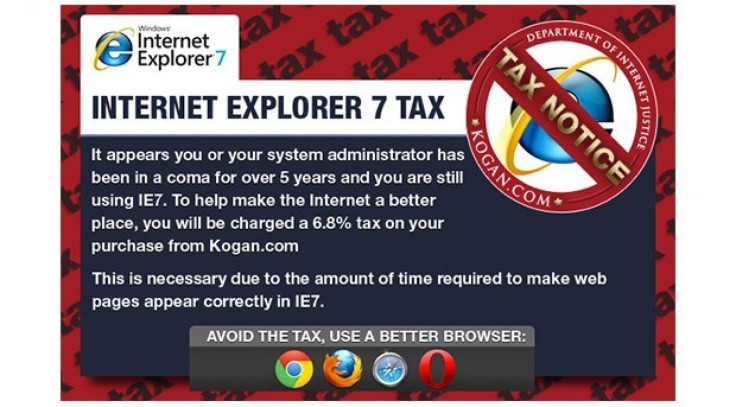Aussie Retailer Charging ?Tax? To Tech-Challenged Consumers

It might be time to tell your computer-feeble grandma or your hippie uncle Ned to update their copies of Microsoft Corp.'s (NASDAQ: MSFT) Internet Explorer browser from that ancient version they downloaded way back in 1999 and never bothered to update. (Update? What's that?)
While that might be generally good advice -- older versions of browsers have higher security risks and less functionality -- it's a money-saving recommendation for anyone buying online from Australian consumer electronics retailer Kogan.
In a clever move aimed not at generating revenue but getting computer users to either update Internet Explorer or, in the company's words, use a better browser, Kogan is charging a 6.8 percent tax to online shoppers who insist on clicking Checkout before clicking the link the vendor offers to Microsoft's latest version of its browser.
The problem with earlier versions of Explorer is that they don't automatically update, something competing browsers have been doing for longer.
The way we've been able to keep our prices so low is by using technology to make our business efficient and streamlined, the company says on its website, explaining the move. One of the things stopping that is our web team having to spend a lot of time making our new website look normal on IE7. This is an extremely old browser, so from today, anyone buying from the site who uses IE7 will be lumped with a 6.8 percent surcharge.
Why 6.8 percent? That's 0.1 percent for each month Internet Explorer 7 has been on the market.
Web designers spend a great deal of time ensuring their sites work across the many browsers available on the market. Add to that the challenges of accommodating stubborn computer users that constantly put off updating their software, and website engineers end up with a time-consuming and costly software-engineering challenge.
Microsoft agrees: Last year it began a campaign to get users to stop using its 10-year-old (10 years!) version of Explorer 6, because it cannot handle all of the functionalities of modern website technologies. The website you are reading right now, as with most others, is allergic to IE7 or earlier versions. Explorer is currently in its ninth version, which works fine.
Explorer's global market share has shrunk, but still enjoys a 50 percent chunk of the market, according to March stats from Net Applications. But 6 percent of all computer users still cling to clunky IE6. Firefox has an 11 percent share of the pie, followed by Chrome with 9 percent.
Microsoft's campaign to get users to update their browsers continues, and Kroger is doing its part to spread the word.
© Copyright IBTimes 2024. All rights reserved.












